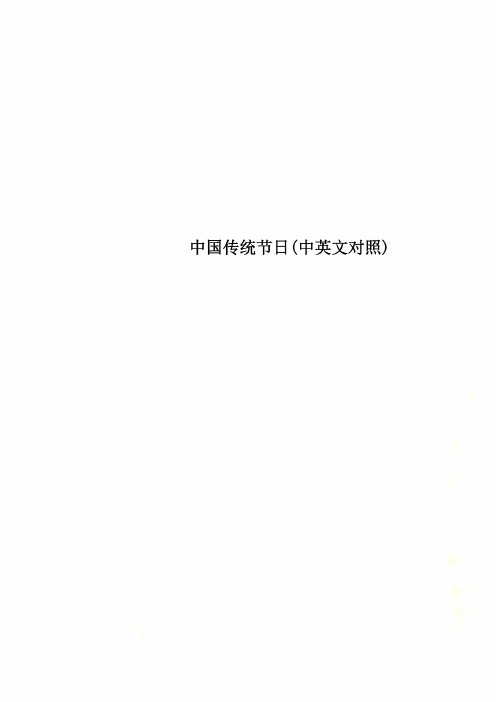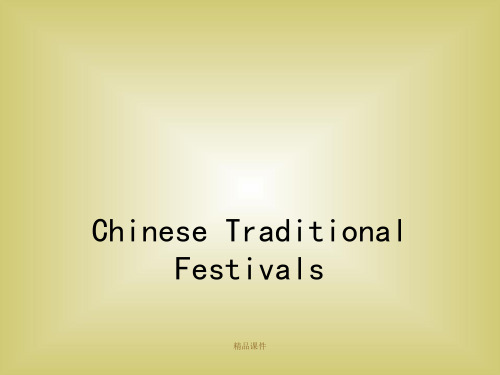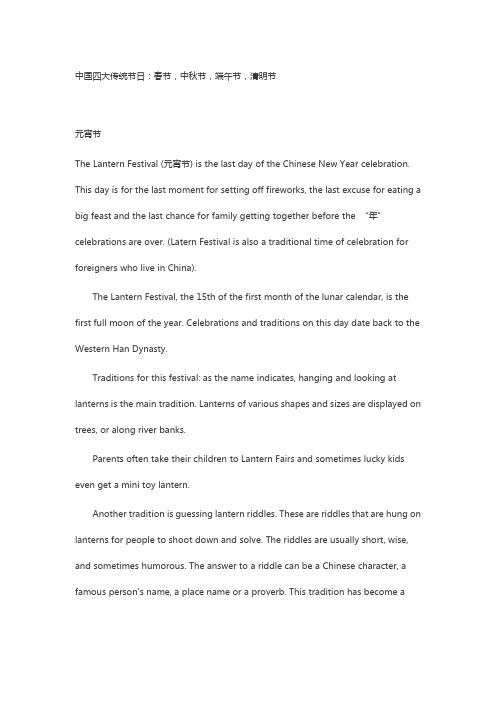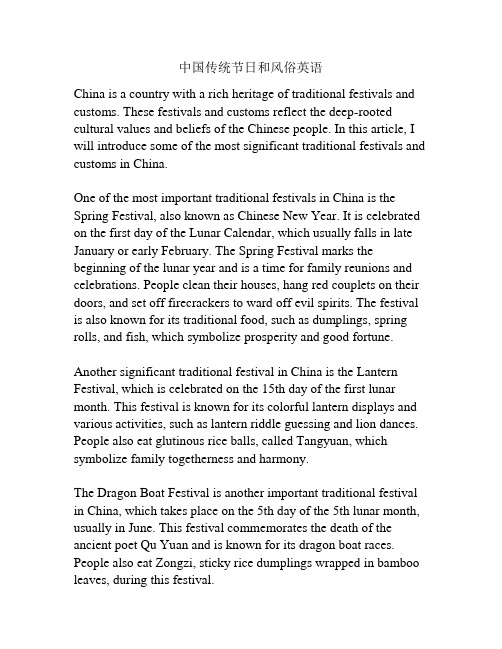中国传统节日和民俗简介(附英文).pdf
中国传统节日(中英文对照)

together to have dinner while watching TV programs.For Chinese at home and abroad, the Spring Festival is always the most important festival.农历的正(zheng)月初一,是中国的农历新年。
在中国的传统节日中,这是一个最重要、最热闹的节日。
因为过农历新年的时候,正是冬末春初,所以人们也把这个节日叫“春节”。
中国人过春节有很多传统习俗。
从腊月二十三起,人们就开始准备过年了。
在这段时间里,家家户户要大扫除,买年货,贴窗花,挂年画,写春联,蒸年糕,做好各种食品,准备辞旧迎新。
春节的前夜叫“除夕”。
除夕之夜,是家人团聚的时候。
一家人围坐在一起,吃一顿丰盛的年夜饭,说说笑笑,直到天亮,这叫守岁。
除夕零点的钟声一响,人们还要吃饺子。
古时候叫零点为“子时”,除夕的子时正是新旧年交替的时候,人们在这时吃饺子,是取“更岁交子”的意思。
这也是“饺子”名称的由来。
过了除夕就是大年初一。
从初一开始,人们要走亲戚、看朋友,互相拜年。
拜年,是春节的重要习俗。
拜年时,大家都要说一些祝愿幸福、健康的吉祥话。
放爆竹是春节期间孩子们最喜欢的活动。
传说燃放爆竹可以驱妖除魔,所以每年从除夕之夜起,到处就响起了接连不断的爆竹声。
阵阵烟花,声声爆竹,给节日增添了喜庆的气氛。
春节期间,很多地方还要举办庙会。
庙会上精彩的舞龙舞狮表演,各式各样的工艺品和地方小吃,吸引千千万万欢度佳节的人们。
随时代的发展,过春节的习俗也有了一些变化。
比如,为防止环境污染,很多城市已禁止燃放烟花爆竹。
但这并不影响节日的热闹气氛。
除夕之夜,家家户户仍然要团聚在一起,一边吃年夜饭,一边看精彩的电视节目,直到大年初一的清晨。
在中国和世界各地华夏子孙的心中,春节永远是最重要的节日。
Lantern Festival(元宵节)The Lantern Festival falls on the 15th day of the 1st lunar month, usually inFebruary or March in the Gregorian calendar. As early as the Western Han Dynasty (206 BC-AD 25), it had become a festival with great significance.This day's important activity is watching lanterns. Throughout the Han Dynasty (206 BC-AD 220), Buddhism flourished in China. One emperor heard that Buddhist monks would watch sarira, or remains from the cremation of Buddha's body, and light lanterns to worship Buddha on the 15th day of the 1st lunar month, so he ordered to light lanterns in the imperial palace and temples to show respect to Buddha on this day. Later, the Buddhist rite developed into a grand festival among common people and its influence expanded from the Central Plains to the whole of China.Till today, the lantern festival is still held each year around the country. Lanterns of various shapes and sizes are hung in the streets, attracting countless visitors. Children will hold self-made or bought lanterns to stroll with on the streets, extremely excited."Guessing lantern riddles"is an essential part of the Festival. Lantern owners write riddles on a piece of paper and post them on the lanterns. If visitors have solutions to the riddles, they can pull the paper out and go to the lantern owners to check their answer. If they are right, they will get a little gift. The activity emerged during people's enjoyment of lanterns in the Song Dynasty (960-1279). As riddle guessing is interesting and full of wisdom, it has become popular among all social strata.People will eat yuanxiao, or rice dumplings, on this day, so it is also called the "Yuanxiao Festival."Yuanxiao also has another name, tangyuan. It is small dumpling balls made of glutinous rice flour with rose petals, sesame, bean paste, jujube paste, walnut meat, dried fruit, sugar and edible oil as filling. Tangyuan can be boiled, fried or steamed. It tastes sweet and delicious. What's more, tangyuan in Chinese has a similar pronunciation with "tuanyuan”, meaning reunion. So people eat them to denote union, harmony and happiness for the family.In the daytime of the Festival, performances such as a dragon lantern dance, a lion dance, a land boat dance, a yangge dance, walking on stilts and beating drums while dancing will be staged. On the night, except for magnificentlanterns, fireworks form a beautiful scene. Most families spare some fireworks from the Spring Festival and let them off in the Lantern Festival. Some local governments will even organize a fireworks party. On the night when the first full moon enters the New Year, people become really intoxicated by the imposing fireworks and bright moon in the sky.每年农历的正月十五日,春节刚过,迎来的就是中国的传统节日--元宵节。
中国传统节日英文版

精品课件
Eat yuán xiāo or tāng yuán
精品课件
精品课件
精品课件
The dragon boat Festival
端午节 duān wǔ jié
5th day of the 5th lunar month
精品课件
qīng tuán(S)
zòng zi
Chinese Traditional Festivals
精品课件
Lunar Calendar 农历
nóng lì
精品课件
Chinese Zodiac
精品课件
Spring Festival 春节
chūn jié
Most important Get together
精品课件
Transport during the Spring Festival
精品课件
The Goddess Chang's fly to the moon 嫦娥奔月
Cháng’é bēn yuè
精品课件
Moon Cake 月饼
yuè bǐng
精品课件
Enjoy the glorious full moon with famlies or friends
(Xī’ ān 2016)
精品课件
The Lantern Festival 元宵节
yuán xiāo jié
huā dēng
精品课件
15th day of the 1st lunar month
The carnival of ancient China
精品课件
Customs Guessing lantern riddles
中国四大传统节日英文介绍

中国四大传统节日:春节,中秋节,端午节,清明节元宵节The Lantern Festival (元宵节) is the last day of the Chinese New Year celebration. This day is for the last moment for setting off fireworks, the last excuse for eating a big feast and the last chance for family getting together before the “年”celebrations are over. (Latern Festival is also a traditional time of celebration for foreigners who live in China).The Lantern Festival, the 15th of the first month of the lunar calendar, is the first full moon of the year. Celebrations and traditions on this day date back to the Western Han Dynasty.Traditions for this festival: as the name indicates, hanging and looking at lanterns is the main tradition. Lanterns of various shapes and sizes are displayed on trees, or along river banks.Parents often take their children to Lantern Fairs and sometimes lucky kids even get a mini toy lantern.Another tradition is guessing lantern riddles. These are riddles that are hung on lanterns for people to shoot down and solve. The riddles are usually short, wise, and sometimes humorous. The answer to a riddle can be a Chinese character, a famous person's name, a place name or a proverb. This tradition has become apopular game with serious staying power even as social development changes other traditions.Other than that, the most important thing to do today is to eat sweet dumplings. In northern China, sweet dumplings made of glutinous rice flour are called “元宵”while in southern part they are called “汤圆”. Typical sweet dumplings are filled with black sesame sauce, sweetened bean paste, or hawthorn. Making “元宵”today is like a game or an activity, so it's seldom done without a reason and a group of friends or family present to help out.端午节The Dragon Boat Festival, also called the Duanwu Festival, is celebrated on the fifth day of the fifth month according to the Chinese calendar. For thousands of years, the festival has been marked by eating zong zi (glutinous rice(糯米)wrapped to form a pyramid using bamboo or reed leaves) and racing dragon boats.The festival is best known for its dragon-boat races, especially in the southern provinces where there are many rivers and lakes. Thisregatta(赛舟会)commemorates the death of Qu Yuan , an honest minister who is said to have committed suicide by drowning himself in a river. Qu was a minister of the State of Chu situated in present-day Hunan and Hubei provinces, during theWarring States Period(475-221BC)(战国时期). He was upright, loyal and highly esteemed for his wise counsel that brought peace and prosperity to the state. However, when a dishonest and corrupt prince vilified Qu, he was disgraced and dismissed from office. Realizing that the country was now in the hands of evil and corrupt officials, Qu grabbed a large stone and leapt into the Miluo River on the fifth day of the fifth month. Nearby fishermen rushed over to try and save him but were unable to even recover his body. Thereafter, the state declined and was eventually conquered by the State of Qin.The people of Chu who mourned the death of Qu threw rice into the river to feed his ghost every year on the fifth day of the fifth month. But one year, the spirit of Qu appeared and told the mourners that a hugereptile(爬行动物)in the river had stolen the rice. The spirit then advised them to wrap the rice in silk and bind it with five different-colored threads before tossing it into the river.During the Duanwu Festival, a glutinous rice pudding called zong zi is eaten to symbolize the rice offerings to Qu. Ingredients such as beans,lotus seeds(莲子),chestnuts(栗子), pork fat and the golden yolk of a salted duck egg are often added to the glutinous rice. The pudding is then wrapped with bamboo leaves, bound with a kind of raffia and boiled in salt water for hours.The dragon-boat races symbolize the many attempts to rescue and recover Qu's body. A typical dragon boat ranges from 50-100 feet in length, with a beam of about 5.5 feet, accommodating two paddlers seated side by side.A wooden dragon head is attached at the bow, and a dragon tail at thestern(船尾). A banner hoisted on a pole is also fastened at the stern and the hull is decorated with red, green and blue scales edged in gold. In the center of the boat is a canopied shrine behind which the drummers,gong(铜锣)beaters andcymbal(铙钹)players are seated to set the pace for the paddlers. There are also men positioned at the bow to set off firecrackers, toss rice into the water and pretend to be looking for Qu. All of the noise and pageantry creates an atmosphere of gaiety and excitement for the participants and spectators alike. The races are held among different clans, villages and organizations, and the winners are awarded medals, banners, jugs of wine and festive meals.清明节Qing Ming is a time to remember the dead and the dearly departed. More important, it is a period to honour and to pay respect to one's deceased ancestors and family members. Because it reinforces the ethic of filial piety, Qing Ming is a major Chinese festival. Literally meaning "clear" (Qing) and "bright" (Ming), this Chinese festival falls in early spring, on the 106th day after the winter solstice. It is a "spring" festival, and it is an occasion for the whole family to leave the home and to sweep the graves of their forebears. Chinese being practical people this sweeping of the graves is given an extended period, that is, 10 days before and after Qing Ming day. Among some dialect groups a whole month is allocated. 清明节是一个纪念祖先的节日。
中国传统节日和风俗英语

中国传统节日和风俗英语China is a country with a rich heritage of traditional festivals and customs. These festivals and customs reflect the deep-rooted cultural values and beliefs of the Chinese people. In this article, I will introduce some of the most significant traditional festivals and customs in China.One of the most important traditional festivals in China is the Spring Festival, also known as Chinese New Year. It is celebrated on the first day of the Lunar Calendar, which usually falls in late January or early February. The Spring Festival marks the beginning of the lunar year and is a time for family reunions and celebrations. People clean their houses, hang red couplets on their doors, and set off firecrackers to ward off evil spirits. The festival is also known for its traditional food, such as dumplings, spring rolls, and fish, which symbolize prosperity and good fortune.Another significant traditional festival in China is the Lantern Festival, which is celebrated on the 15th day of the first lunar month. This festival is known for its colorful lantern displays and various activities, such as lantern riddle guessing and lion dances. People also eat glutinous rice balls, called Tangyuan, which symbolize family togetherness and harmony.The Dragon Boat Festival is another important traditional festival in China, which takes place on the 5th day of the 5th lunar month, usually in June. This festival commemorates the death of the ancient poet Qu Yuan and is known for its dragon boat races. People also eat Zongzi, sticky rice dumplings wrapped in bamboo leaves, during this festival.Apart from festivals, China also has various customs that are deeply rooted in its culture. One of the most well-known customs is the tradition of giving red envelopes, or Hongbao, during Chinese New Year. Red envelopes, usually filled with money, are given to children and unmarried adults as a symbol of good luck and blessings for the coming year.Tea culture is also an integral part of Chinese customs. Chinese people have a long history of drinking tea and have developed sophisticated tea-drinking rituals. Tea ceremonies, such as Gongfu tea ceremony, are practiced to appreciate the taste, aroma, and beauty of tea.Another interesting custom in China is the etiquette of showing respect to elders. Younger generations are expected to greet and show respect to their elders by bowing or addressing them using appropriate titles. This custom highlights the importance of filial piety and the respect for seniors in Chinese society.In conclusion, China has a rich tradition of festivals and customs that play an essential role in its culture. These festivals, such as the Spring Festival and the Lantern Festival, are occasions for family reunions, celebration, and reflection. Customs like the tradition of giving red envelopes and tea ceremonies reflect the values of luck, respect, and appreciation. These traditions and customs not only preserve the cultural heritage of China but also promote unity and connectivity among its people.。
中国传统节日介绍英文版

Mid Autumn Festival
Date
The 15th day of the eight lunar month, commonly in September or October
History and Tradition
Also known as the Moon Festival, it's a time for family reunions and moon gaming Traditions include eating mooncakes and landscapes made of various shapes and sizes
Characteristics
These festivals typically involve family gatherings, special foods, and activities that are deeply rooted in Chinese culture and often tied to lunar calendar dates, academic cycles, and any legends or historical events
Origin and History of Chinese Traditional Festivals
Incident Origins
Many Chinese festivals have their roots in any agricultural practices and beliefs, so as the Spring Festival (Chinese New Year) marking the end of winter and the beginning of the lunar new year, or the Mid Autumn Festival celebrating the harvest moon
中国传统节日英文介绍

Qing Ming
Du Mu( Tang Dynasty )
Qing Ming usually comes with rainy days
பைடு நூலகம்
清明时节雨纷纷, 路上行人欲断魂, 借问酒家何处有, 牧童遥指杏花村.
I ask a Buffalo boy for tavern ['tævən] to release my sadness Passengers on the way are full of soreness
He points to the village covered by apricot ['eiprikɔt] blossoms
Chinese Valentine’s Day
The seventh day of the seventh month of the lunar calendar is known as Qi Xi Jie or Qiqiao Jie, a traditional holiday that has been recently called China's Valentine's Day.
In China, the most traditional and popular Spring Festival food is dumpling, which looks like the moon with vegetables and meat mixed in it. The Chinese name of dumpling is “JIAO ZI”, ”JIAO” means ”cross”, ”ZI” is Chinese traditional time represents “24:00”, so the Chinese word “JIAO ZI” means “cross 24:00”, just the dividing point of last year and next year. So when it comes to 24:00, every family begins eating dumplings.
中国节日介绍英文版

中国节日介绍英文版中国节日介绍英文版一、农历节日农历正月初一春节(the Spring Festival)农历正月十五元宵节(Lantern Festival)农历五月初五端午节(the Dragon-Boat Festival)农历七月初七乞巧节(中国情人节)(Double-Seventh Day) 农历八月十五中秋节(the Mid-Autumn Festival)农历九月初九重阳节(the Double Ninth Festival)农历腊月初八腊八节(the laba Rice Porridge Festival)二、阳历节日1月1日元旦(New Year's Day)2月2日世界湿地日(World Wetlands Day)2月14日情人节(Valentine's Day)3月3日全国爱耳日3月5日青年志愿者服务日3月8日国际妇女节(International Women' Day)3月9日保护母亲河日3月12日中国植树节(China Arbor Day)3月14日白色情人节(White Day)3月14日国际警察日(International Policemen' Day)3月15日世界消费者权益日(World Consumer Right Day)3月21日世界森林日(World Forest Day)3月21日世界睡眠日(World Sleep Day)3月22日世界水日(World Water Day)3月23日世界气象日(World Meteorological Day)3月24日世界防治结核病日(World Tuberculosis Day)4月1日愚人节(April Fools' Day)4月5日清明节(Tomb-sweeping Day)4月7日世界卫生日(World Health Day)4月22日世界地球日(World Earth Day)4月26日世界知识产权日(World Intellectual Property Day) 5月1日国际劳动节(International Labour Day)5月3日世界哮喘日(World Asthma Day)5月4日中国青年节(Chinese Youth Day)5月8日世界红十字日(World Red-Cross Day)5月12日国际护士节(International Nurse Day)5月15日国际家庭日(International Family Day)5月17日世界电信日(World Telecommunications Day)5月20日全国学生营养日5月23日国际牛奶日(International Milk Day)5月31日世界无烟日(World No-Smoking Day)6月1日国际儿童节(International Children's Day)6月5日世界环境日(International Environment Day)6月6日全国爱眼日6月17日世界防治荒漠化和干旱日(World Day to combat desertification)6月23日国际奥林匹克日(International Olympic Day)6月25日全国土地日6月26日国际禁毒日(International Day Against Drug Abuse and Illicit Trafficking)7月1日中国共产党诞生日(Anniversary of the Founding of the Chinese Communist Party)7月1日国际建筑日(International Architecture Day)7月7日中国人民抗日战争纪念日7月11日世界人口日(World Population Day)8月1日中国人民解放军建军节(Army Day)8月12日国际青年节(International Youth Day)9月8日国际扫盲日(International Anti-illiteracy Day)9月10日中国教师节(Teacher's Day)9月16日中国脑健康日9月16日国际臭氧层保护日(International Day for the Preservation of the Ozone Layer)9月20日全国爱牙日9月21日世界停火日(World Cease-fire Day)9月27日世界旅游日(World Tourism Day)10月1日中华人民共和国国庆节(National Day)10月1日国际音乐日(International Music Day)10月1日国际老年人日(International Day of Older Persons)。
中国四大传统节日英文介绍

中国四大传统节日:春节,中秋节,端午节,清明节元宵节The Lantern Festival (元宵节) is the last day of the Chinese New Year celebration. This day is for the last moment for setting off fireworks, the last excuse for eating a big feast and the last chance for family getting together before the “年”celebrations are over. (Latern Festival is also a traditional time of celebration for foreigners who live in China).The Lantern Festival, the 15th of the first month of the lunar calendar, is the first full moon of the year. Celebrations and traditions on this day date back to the Western Han Dynasty.Traditions for this festival: as the name indicates, hanging and looking at lanterns is the main tradition. Lanterns of various shapes and sizes are displayed on trees, or along river banks.Parents often take their children to Lantern Fairs and sometimes lucky kids even get a mini toy lantern.Another tradition is guessing lantern riddles. These are riddles that are hung on lanterns for people to shoot down and solve. The riddles are usually short, wise, and sometimes humorous. The answer to a riddle can be a Chinese character, a famous person's name, a place name or a proverb. This tradition has become apopular game with serious staying power even as social development changes other traditions.Other than that, the most important thing to do today is to eat sweet dumplings. In northern China, sweet dumplings made of glutinous rice flour are called “元宵”while in southern part they are called “汤圆”. Typical sweet dumplings are filled with black sesame sauce, sweetened bean paste, or hawthorn. Making “元宵”today is like a game or an activity, so it's seldom done without a reason and a group of friends or family present to help out.端午节The Dragon Boat Festival, also called the Duanwu Festival, is celebrated on the fifth day of the fifth month according to the Chinese calendar. For thousands of years, the festival has been marked by eating zong zi (glutinous rice(糯米)wrapped to form a pyramid using bamboo or reed leaves) and racing dragon boats.The festival is best known for its dragon-boat races, especially in the southern provinces where there are many rivers and lakes. Thisregatta(赛舟会)commemorates the death of Qu Yuan , an honest minister who is said to have committed suicide by drowning himself in a river. Qu was a minister of the State of Chu situated in present-day Hunan and Hubei provinces, during theWarring States Period(475-221BC)(战国时期). He was upright, loyal and highly esteemed for his wise counsel that brought peace and prosperity to the state. However, when a dishonest and corrupt prince vilified Qu, he was disgraced and dismissed from office. Realizing that the country was now in the hands of evil and corrupt officials, Qu grabbed a large stone and leapt into the Miluo River on the fifth day of the fifth month. Nearby fishermen rushed over to try and save him but were unable to even recover his body. Thereafter, the state declined and was eventually conquered by the State of Qin.The people of Chu who mourned the death of Qu threw rice into the river to feed his ghost every year on the fifth day of the fifth month. But one year, the spirit of Qu appeared and told the mourners that a hugereptile(爬行动物)in the river had stolen the rice. The spirit then advised them to wrap the rice in silk and bind it with five different-colored threads before tossing it into the river.During the Duanwu Festival, a glutinous rice pudding called zong zi is eaten to symbolize the rice offerings to Qu. Ingredients such as beans,lotus seeds(莲子),chestnuts(栗子), pork fat and the golden yolk of a salted duck egg are often added to the glutinous rice. The pudding is then wrapped with bamboo leaves, bound with a kind of raffia and boiled in salt water for hours.The dragon-boat races symbolize the many attempts to rescue and recover Qu's body. A typical dragon boat ranges from 50-100 feet in length, with a beam of about 5.5 feet, accommodating two paddlers seated side by side.A wooden dragon head is attached at the bow, and a dragon tail at thestern(船尾). A banner hoisted on a pole is also fastened at the stern and the hull is decorated with red, green and blue scales edged in gold. In the center of the boat is a canopied shrine behind which the drummers,gong(铜锣)beaters andcymbal(铙钹)players are seated to set the pace for the paddlers. There are also men positioned at the bow to set off firecrackers, toss rice into the water and pretend to be looking for Qu. All of the noise and pageantry creates an atmosphere of gaiety and excitement for the participants and spectators alike. The races are held among different clans, villages and organizations, and the winners are awarded medals, banners, jugs of wine and festive meals.清明节Qing Ming is a time to remember the dead and the dearly departed. More important, it is a period to honour and to pay respect to one's deceased ancestors and family members. Because it reinforces the ethic of filial piety, Qing Ming is a major Chinese festival. Literally meaning "clear" (Qing) and "bright" (Ming), this Chinese festival falls in early spring, on the 106th day after the winter solstice. It is a "spring" festival, and it is an occasion for the whole family to leave the home and to sweep the graves of their forebears. Chinese being practical people this sweeping of the graves is given an extended period, that is, 10 days before and after Qing Ming day. Among some dialect groups a whole month is allocated. 清明节是一个纪念祖先的节日。
- 1、下载文档前请自行甄别文档内容的完整性,平台不提供额外的编辑、内容补充、找答案等附加服务。
- 2、"仅部分预览"的文档,不可在线预览部分如存在完整性等问题,可反馈申请退款(可完整预览的文档不适用该条件!)。
- 3、如文档侵犯您的权益,请联系客服反馈,我们会尽快为您处理(人工客服工作时间:9:00-18:30)。
中国传统节日Traditional Chinese holiday
中国的传统节庆膳食是节日必不可少的伴侣。
例如,我国的端午节(the Dragon Boat Festival)是纪念古代诗人屈原的日子。
那一天,人们通常要赛龙舟、
吃粽子(zongzi)。
中秋节是观赏满月的日子。
圆圆的月亮象征着圆满,象征着家
庭团聚。
因此,中秋节(TheMid-autumnFestival)的特制食品是一种圆形的月饼。
,除了常见的家禽和春节是中国的农历新年(the Chinese lunar New Year’s holiday)
肉类之外,人们还要按各自的地方习俗烹制传统食物,如饺子和年糕。
端午节The Duanwu Festival
端午节,又叫龙舟节,是为了纪念爱国诗人屈原。
屈原是一位忠诚和受人
敬仰的大臣,他给国家带来了和平和繁荣。
但最后因为受到诽谤(vilify)而最终
投河自尽。
人们撑船到他自尽的地方,抛下粽子,希望鱼儿吃粽子,不要吃屈
原的身躯。
几千年来,端午节的特色在于吃粽子(glutinous dumplings)和赛龙舟,尤其是在一些河湖密布的南方省份。
春节The Spring Festival
在我国,一年有很多节日,在这些节日中,我最喜欢春节。
这不仅因为它
是一年中最大的节日,更因为它是新一年的开始,给人们带来新的希望,也因
为它是亲朋好友团聚的时刻。
不管身在何方,人们总会在春节前回到家里准备
过节。
通常,我们会在除夕夜吃一顿丰盛的晚餐,之后家人团座一起,分享一
年以来的生活以及新年计划。
有的人则会玩游戏或者出去玩。
大年初一,人们通常会早起,会与见到的人说吉祥话。
孩子们会得到压岁
钱。
在接下来的几天里,人们会带上新年祝福互相串门拜年。
总之,春节是一
个欢聚一堂、供人享乐的日子。
元旦New Year's Day
-day holiday, so I can go out have fun Today is the New Year’s Day. I have a three
or stay at hometo have a good rest. Today, my parents take me out. We go to the mall. Many things are cheap somy mother buys many. I have a new cloth and a pair
of shoes. I am so happy. They are the gifts forthe New Year. At night, we have a big
dinner outside. The foods are so delicious. Today is a happyday.
国庆节The National Day
10月1日是我国的国庆节,这是全国的共同节日。
这一天是中华人民共和
国开始的标志。
在那天,全国到处都有很多庆祝活动,上至中央政府到普通老百姓。
公共
场所,包括大的广场和公园,都装饰成节日主题。
近年,国庆节同样也是所有
人都期待的短假黄金周。
随着生活水平的提高,人们又更多的钱和渴望去旅
游,黄金周对他们来说是一个很好的机会。
除此之外,对于那些不想外出的人
来说同样也是休息的好时机。
因此,国庆节对中国人来说意味着很多。
October 1stis the national day of our country, which is a public holiday for the
whole country. It’san important day that marks the beginning of PR
C. On that day, there are plenty of celebrationsholding throughout the country,
from the central government to the general people. And publicplaces, including big squares, parks are decorated in festive theme. In recent years, the nationalholiday
means the golden week as well, which is a short holiday that all people expect to.
With theimprovement of living standards, people have more money and desire to
travel and the goldenweek is a good chance for them. Besides, for those people who
would not go out, it’s a good timeto have a good rest as well. Therefore, the national day means a lot to the Chinese.
北京胡同Beijing hutongs
北京有无数的胡同(hutong)。
平民百姓在胡同里的生活给古都北京带来了无
穷的魅力。
北京的胡同不仅仅是平民百姓的生活环境,而且还是一门建筑艺
术。
通常,胡同内有一个大杂院,房间够4到10个家庭的差不多20口人住。
所以,胡同里的生活充满了友善和人情味。
如今,随着社会和经济的飞速发
展,很多胡同被新的高楼大厦所取代。
但愿胡同可以保留下来。
剪纸(paper cutting)。
